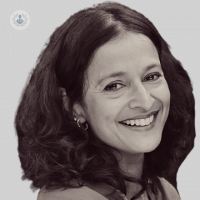Electrophysiology explained
Written in association with:In this informative guide for patients, highly respected consultant cardiologist and electrophysiologist Dr Anita Arya shares her expert insight on the subspeciality of electrophysiology. The revered specialist sheds light on the applications of electrophysiology and how the field has evolved in recent years.

What is electrophysiology?
Electrophysiology is a subspecialty of cardiology that looks specifically at the electrical system of the heart. In some patients, disorders of this system can cause palpitations or rhythm disturbances (arrhythmias). There are many causes of arrhythmias, for example, an extra 'circuit' that you are born with or something that develops later in life.
Electrophysiology procedures involve the study of the electrics of the heart and rhythm disturbances. It involves the mapping and possible cauterisation of circuits with the aim of curing or improving patient symptoms.
An electrophysiologist is a cardiologist who has super specialised in heart rhythm problems. Electrophysiology has hugely changed over the last twenty years in terms of our understanding of different rhythm problems and how to treat them. We still use medication but many more rhythm disturbances can be treated by ablation. The technology to do this has also improved and has made these procedures quicker, safer and more effective.
What is electrophysiology used for?
Electrophysiology is the theory and practice of diagnosing heart rhythm disturbances and treating them. This might include electrical tests of the heart and treatment with lifestyle, drug therapy or a keyhole procedure called ablation.
What are some electrophysiology procedures?
There are a number of different electrophysiology procedures, some for simple rhythm disorders others for more complex problems. This can include testing the heart electrically to find out where the circuit or ‘irritable focus’ comes from. We then use heat or ice energy to cauterise the circuit.
What is the difference between a cardiologist and an electrophysiologist?
All electrophysiologists are cardiologists who have gone more in depth in our training, specifically into the electrics of the heart. Most electrophysiologists will also still diagnose and treat general cardiology conditions as there is an overlap.
If you would like to schedule a consultation with Dr Arya, you can do so by visiting her Top Doctors profile.


